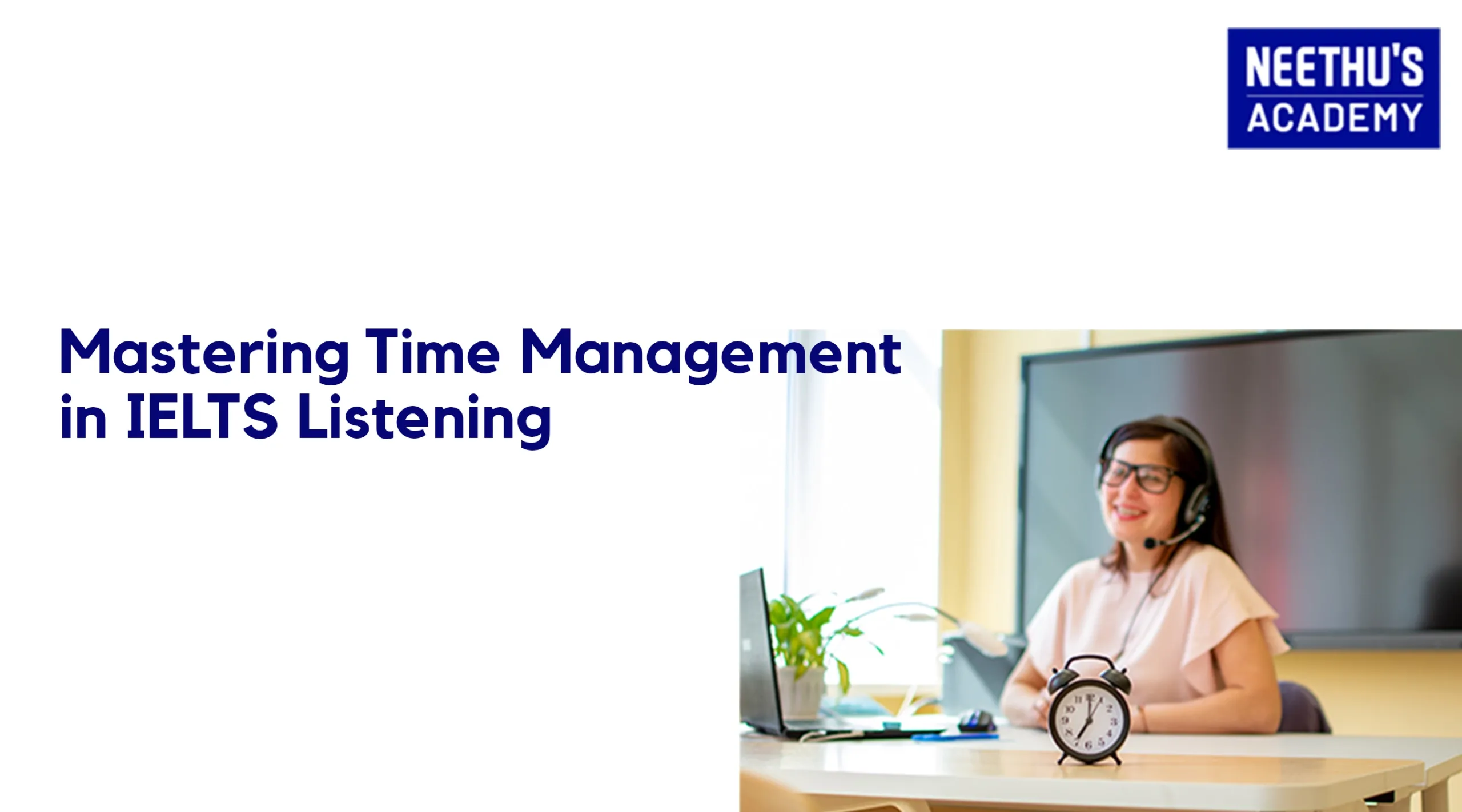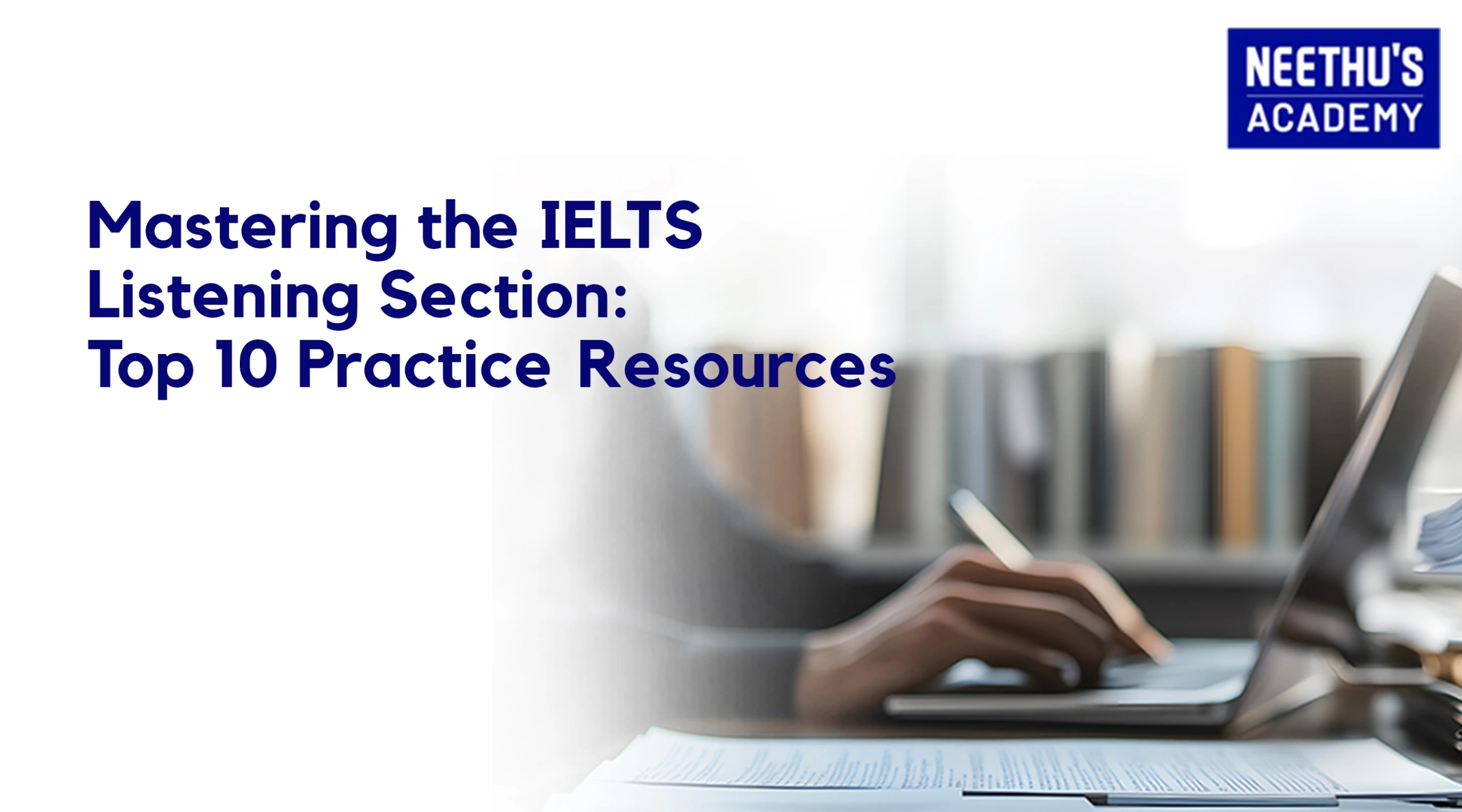Time Management in IELTS Listening: Techniques for Success
Time management is the only way to succeed in the IELTS Listening module. In 30 minutes, 40 questions must be completed, and there is no replay option for the recordings. Therefore, utilizing your time effectively is the most important thing to achieve a high score. This guide provides practical strategies, advanced techniques, and tips for mastering the IELTS Listening test. It also shows how IELTS coaching in Kochi can provide expert guidance, personalized support, and high-quality resources to maximize performance.
IELTS Listening assesses listening comprehension in a variety of accents, contexts, and tones. It also tests the ability in time management. Therefore, with so many questions being quite varied in terms of difficulty and time limits can be very tight, good preparation is necessary. There will be some discussion of time management strategies and a variety of resources that will give us more confidence in listening improvement, leading to success in the actual test.
Significance of Time Management in IELTS Listening Test
Time management in the IELTS listening test is not only about completing the test within the time allotted but also about:
Having a composed mind: Proper time management reduces stress and increases concentration.
Answering within the given time: So that no question is left out.
Improving accuracy: Giving time for review, thereby reducing careless mistakes.
Thus, without proper time management, even candidates with excellent listening ability may fail to give their best.
Introduction to IELTS Listening Module
The IELTS Listening has four parts, each having a different variety of skills as follows:
Section 1: A conversation in a social or everyday situation with transactional exchanges, usually over the telephone while purchasing a ticket etc.
Section 2: Monologues, such as an academic speech or announcements concerning general topics.
Section 3: A conversation between at least two people in an educational or training context, such as between two students discussing an assignment.
Section 4: Lecture or presentation of an academic topic. It is harder and requires concentrated listening.
Each section is more difficult than the one before it, and you’ll have to answer 40 questions based on these recordings. You have 30 minutes to listen and answer and 10 minutes to transfer your answers to the answer sheet.
Understanding the Time Barriers for IELTS Listening
There are quite a few timing challenges in the IELTS Listening section:
Pre-listening time: You only have 30–40 seconds to read questions before each segment.
One-time listening: The recordings play only once, so you need to be attentive.
Simultaneous tasks: Writing while listening is rather challenging.
Transfer of answer: You may feel there is not enough time to complete the transfer of your answer as you have only 10 minutes for this task.
Essential Time Management
Strategic time distribution enables you to:
1. Be able to predict key points in the recording based on the questions.
2. Do not spend too much time on one question.
3. You will be clear and correct during the answer transfer.
Important IELTS Listening Tips for Time Management
- Preview Questions Before Listeners
Use the preparation time before each section to quickly read the questions. Underline or highlight the keyword, such as dates, names, or locations, so you know which part of the recording to focus on.
- Maintain Concentration During the Test
Generally, the recordings are full of distractors, including additional information or changes in the information. Listen and pay attention to the information that will be provided for answering the questions.
- Write answers while listening
Train yourself to write down answers immediately as you listen. This helps you not to forget vital information or run out of time later. Use abbreviations or shorthand to save time.
- Use the Time Between Sections
The small breaks between sections are very valuable. Use that time to scan the questions coming and predict what type of answers you will be writing.
- Practice Writing Answers Quickly
In 10 minutes of transfer time, ensure your handwriting is legible and that your answers are put correctly on the answer sheet. Familiarization with this process in practice tests will save much time and errors.
Advanced IELTS Listening Test Techniques
- Predict Answers Using Context
Pay attention to the type of question. If a time or date is expected as an answer, anticipate numerical information.
- Master note-taking Techniques
Create abbreviations and shorthand for note-taking at this point. Note down as much necessary information so you don’t miss recording parts.
- Improve your Speed with Mock Tests
Regular mock tests improve not only your listening skills but also the ability to manage time well. Simulate real test conditions to practice staying calm and efficient under pressure.
- Learn from Mistakes
Analyze your performance in mock tests for repeated mistakes or time management problems. Concentrate on removing such weaknesses in future practice sessions.
Tools and Resources to Improve Your Listening Skills
Apps and Web-based Tools
Use technology to complement your preparation with these tools:
- IELTS Prep by British Council: Provides free practice tests and tips.
- TED Talks and Podcasts: Improve your listening skills for varying accents and topics.
- BBC Learning English: It provides listening exercises and vocabulary-building tools.
Coaching Centres in Kerala
Reputable coaching centers in Kochi, like Neethu’s Academy ,provide structured courses, mock tests, and personalized guidance to help you master the IELTS Listening module.
Additional Tips to Succeed
Learn about Accents: The IELTS Listening test has UK, US, Australian, and Canadian accents. You will get used to the variations if you listen to audio sources in different accents.
Learn Vocabulary: Familiarity with words and phrases in various contexts will enable you to comprehend better and faster.
Practice under Conditions: Practice the test within the time constraints to perfect the art of time management.
Conclusion
The art of time management in IELTS listening is what’s going to get you the score you want. Proper preparation makes you well-equipped to handle the test with confidence, from skimming questions to predicting answers and practicing with mock tests.
All candidates aspiring from Kerala could benefit from the training at the best IELTS coaching centers in Kochi, such as Neethu’s Academy, as high-quality trainers provide comprehensive resources with personal attention. The coaching centers would enhance your listening ability and also develop some effective techniques for you to reach your aim.
Start your preparation today, and step ahead to acquire success in IELTS!
Frequently Asked Questions





